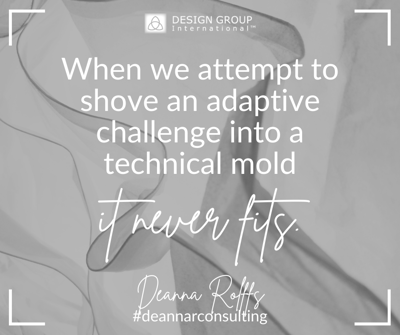The path isn’t a straight line; it’s a spiral. You continually come back to things you thought you understood and see deeper truths. - Barry H. Gillespie
As a young child, I was convinced all adults knew everything. I was enculturated into a truth/fiction binary; answers were clear, doled out with access to power.
I thought problems could be easily identified, solved quickly, always by an authority or expert, requiring a few minor, exact, modifications; then voila, the solution is quickly identified. Problem solved.
 Enter lived experience. I have learned that “solutions” require experiments, many mistakes, new discoveries, adjusting, learning, and most often require much time to implement. Adaptive challenges cannot be implemented by edict.
Enter lived experience. I have learned that “solutions” require experiments, many mistakes, new discoveries, adjusting, learning, and most often require much time to implement. Adaptive challenges cannot be implemented by edict.
As a new business owner, my gut reaction is to technically solve challenges. When COVID19 hit the United States last March, I had, 3-months-prior, taken the petrifying and exhilarating leap into full-time consulting. I observed veteran, male consultants in our community of practice doing their thing, seemingly cool as cucumbers. After a meeting, unexpected tears popped to my eyes. I was angry and scared: What do they know that I don't? Am I doing it wrong? Why don't they tell me the secret to success? Turns out, I had to find my own path, and it was neither linear nor technical.
“Technical challenges are those that can be solved by the knowledge of experts, whereas adaptive challenges are complex and ambiguous in nature, and may be volatile or unpredictable. Solutions to this type of challenges usually require people to learn new ways of doing things, change their attitudes, values, and norms and adopt an experimental mind-set.” Technical Challenges vs. Adaptive Challenges
-4.png?width=300&name=032421_Deanna%20Blog%20Quote%20(4)-4.png) In the last fifteen months, I've supported more than fifty leaders and hundreds of adult learners to grapple with adaptive challenges. From a Fortune500 company to a 3-year-old grassroots, rural nonprofit; from a large international corporation to small, local, arts organizations; from learning cohorts of educators to facilitating networks of leaders on the west coast. Leadership is one adaptive challenge after another.
In the last fifteen months, I've supported more than fifty leaders and hundreds of adult learners to grapple with adaptive challenges. From a Fortune500 company to a 3-year-old grassroots, rural nonprofit; from a large international corporation to small, local, arts organizations; from learning cohorts of educators to facilitating networks of leaders on the west coast. Leadership is one adaptive challenge after another.
Have you noticed the plethora of anti-racism public statements since last summer when more white people began to awaken to racial injustice? Adaptiveness is particularly required in anti-oppression commitments, especially when we join the efforts from privilege. Anti-racism, white consciousness, and anti-white supremacy are squarely adaptive, not technical. Adaptiveness brings anxiety, lack of clarity, challenges long-held assumptions and approaches, and much ambiguity, often via (technical) resistance. Pressure is everywhere to solve quickly and cleanly, by dominating the problem.
Although it's messy, let's resist the allure of relaxing against and taking comfort in technical solutions. Daily I’m inspired by committed leaders, working adaptively, tripping and falling along the way. I see you rising again with stronger commitment.
"A champion is defined not by their wins but by how they can recover when they fall.” -Serena Williams
Our western brains love clarity, linearity, and a clean, crisp list of goals, objectives, and outcomes. But life is rarely linear or clear. When we leaders attempt to shove an adaptive challenge into a technical mold, it never fits. It may seem to fit for a short bit, but it will explode or seep out. Adaptive challenges will not be contained in neat and tidy technical packages.

I notice three practices that encourage adaptive leadership.
Get on the balcony. As leaders, we are invested on the metaphorical dance floor: engaging, supporting, and partnering in detailed, action oriented work. Stepping onto the balcony is imperative to survey the dance floor, strategize, grapple, and adjust.
Prioritize learning and application of technical and adaptive change on your team(s). Learning and applying builds mental muscle and team orientation. We need each other. Apply this to teams you lead and teams on which you serve.
Apply adaptive leadership to yourself. Share your personal wonderings and dedication to a learning orientation. Letting go of being the expert makes room for adaptiveness, curiosity, growth and transformation.
We meet here to remind each other that life is a journey of learning, applying and adjusting to be effective change leaders. The problem-solution mindset and strategies are helpful in technical work, but the topics we explore here are adaptive, with complex contexts and unclear solutions.
“The single biggest failure in the exercise of leadership is to treat adaptive challenges like technical problems, and therefore to apply technical solutions.” -Ronald Heifetz
-Aug-12-2023-10-01-07-4810-PM.png?width=300&name=032421_Deanna%20Blog%20Quote%20(2)-Aug-12-2023-10-01-07-4810-PM.png) Notice and celebrate the life-giving beauty and transformation of adaptive change.
Notice and celebrate the life-giving beauty and transformation of adaptive change.
How are you working in adaptive spaces? Are you pausing to reflect on the beautiful, life-giving, sacred spaces of adaptiveness? What can you celebrate as you let go of technical solutions and apply adaptive leadership?
Fellow leaders and learners, I wish you courage and resilience for the journey.
Peace to you,


What I’m Reading
Regarding Technical Problems and Adaptive Solutions:
- America's Long Overdue Awakening to Systemic Racism by Justin Woreland
- A Survival Guide for Leaders, Harvard Business Review by Heifetz, Linsky
- Video: Technical vs Adaptive Challenges, MicroLesson by Kellie Ady
- Technical Problems vs. Adaptive Challenges, Groupsmith

Questions for Consideration
Regarding Technical Problems and Adaptive Solutions:
- What adaptive challenges are you tempted to solve with technical solutions?
- How do you know if a challenge is adaptive or technical? Why is it important to know?
- Where do you see this adaptive vs. technical framework apply (health care, education, housing, etc.)?
- Which adaptive challenges do you grapple with most often? Where do you go for thought partnership?

Upcoming
Leadership & Learning Topics:
- Liberatory Design Thinking is the Bomb
- What Do You Mean by Brave Spaces? I Want Safety!
- Triple Loop Learning Meets Anti-Racism
- Wait, You’re Saying I Have Power?
- The Alluring Lies of Rugged Individualism and Meritocracy
Tags:
privilege, anti-white supremacy, journey, technical problems, anti-racism, business startup, leadership, woman-owned business, anti-oppression, process consulting, power, new consulting practice
March 24, 2021




Comments